|
|
|
Sort Order |
|
|
|
Items / Page
|
|
|
|
|
|
|
| Srl | Item |
| 1 |
ID:
011927


|
|
|
|
|
| Publication |
march 1997.
|
| Description |
57-70
|
|
|
|
|
|
|
|
|
|
|
|
|
|
|
|
| 2 |
ID:
176505
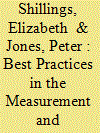

|
|
|
|
|
| Summary/Abstract |
Measuring the impact of Track Two dialogues has proven a difficult challenge for the field over many years. Each dialogue is different, which makes a standardized test difficult to achieve. Moreover, different actors wish to measure different things: “value” for money; impact on the conflict; how certain facilitation techniques work; and others. In this article, we present a model that can be used to measure the impact of a dialogue over time, while also encouraging reflective practice in the field. This “Reflective Practice Model” can be used to provide a snapshot of a particular moment – or as a vehicle for the accumulation of a series of such moments – thereby providing a means to observe and measure changes as the dialogue goes on.
|
|
|
|
|
|
|
|
|
|
|
|
|
|
|
|
| 3 |
ID:
176501
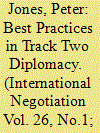

|
|
|
|
|
| Summary/Abstract |
While “Track Two Diplomacy” has been intensively researched since its founding some 60 years ago, much remains to be done to explore important gaps in our understanding of these dialogues. Track Two presents unusual research problems, given its operational and often confidential nature. The contributions to this special issue of International Negotiation tackle some of the key issues confronting the field in an effort to present where we stand in terms of best practices and where further thought and research is required.
|
|
|
|
|
|
|
|
|
|
|
|
|
|
|
|
| 4 |
ID:
027566
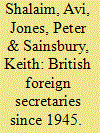

|
|
|
|
|
| Publication |
Newton Abboi, David and Charles, 1977.
|
| Description |
266p.
|
| Standard Number |
0715373811
|
|
|
|
|
|
|
|
|
|
|
|
Copies: C:1/I:0,R:0,Q:0
Circulation
| Accession# | Call# | Current Location | Status | Policy | Location |
| 016873 | 327.41085/SHL 016873 | Main | On Shelf | General | |
|
|
|
|
| 5 |
ID:
123172
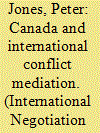

|
|
|
|
|
| Publication |
2013.
|
| Summary/Abstract |
Abstract This article explores the attitudes of Canadian officials towards international conflict mediation and towards the potential for greater official Canadian involvement in the field. The study is based on extensive interviews with Canadian officials who have been involved in mediation at various points over a 20-year period. It finds that Canada, and particularly the Department of Foreign Affairs and International Trade (DFAIT), has taken a largely ad hoc approach to its involvement in the field. Prior to the initiation of this study, there had been no attempt to develop an institutional capacity in this field within DFAIT or to keep track of the personnel involved in such experiences, much less to develop a trained cadre of such individuals. This stands in contrast to the efforts of countries that have prioritized mediation as a foreign policy activity, such as some Scandinavian countries and Switzerland. Many of those interviewed pointed to these countries as potential models for Canada in this field, but it became apparent in discussions that most of those interviewees were not necessarily well-informed as to what these countries have done; there was just a general sense that these countries do it well and that Canada could learn from them. Moreover, none of the interviewees demonstrated significant familiarity with the vast literature on mediation. Those interviewed made recommendations as to how Canada might develop its official mediation capacities so as to play a more active and focused role in this field.
|
|
|
|
|
|
|
|
|
|
|
|
|
|
|
|
| 6 |
ID:
129034


|
|
|
| 7 |
ID:
082869


|
|
|
| 8 |
ID:
048829


|
|
|
|
|
| Publication |
London, Arnold, 1996.
|
| Description |
xv, 495p.Pbk
|
| Standard Number |
034065290X
|
|
|
|
|
|
|
|
|
|
|
|
Copies: C:1/I:0,R:0,Q:0
Circulation
| Accession# | Call# | Current Location | Status | Policy | Location |
| 039699 | 944.04/JON 039699 | Main | On Shelf | General | |
|
|
|
|
| 9 |
ID:
122007


|
|
|
|
|
| Publication |
2013.
|
| Summary/Abstract |
Former Iranian President Mahmoud Ahmadinejad's visit to Cairo on 5 February 2013 was, potentially, an historic event. Iran and Egypt have had decidedly difficult relations since the 1979 Islamic Revolution, mirroring the suspicion with which the Iranian regime has been treated across the region. The advent of an Islamic government in Egypt provided an opportunity to improve the situation. But the visit was a bust. Indeed, relations have, if anything, worsened since the outbreak of fighting in Syria, which has pitted Iran against much of the Arab world once again.
|
|
|
|
|
|
|
|
|
|
|
|
|
|
|
|
| 10 |
ID:
049499
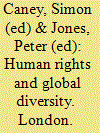

|
|
|
|
|
| Publication |
London, Frank Cass Publishers, 2001.
|
| Description |
173p.
|
| Standard Number |
071468161X
|
|
|
|
|
|
|
|
|
|
|
|
Copies: C:1/I:0,R:0,Q:0
Circulation
| Accession# | Call# | Current Location | Status | Policy | Location |
| 044229 | 323/CAN 044229 | Main | On Shelf | General | |
|
|
|
|
| 11 |
ID:
098652
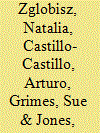

|
|
|
|
|
| Publication |
2010.
|
| Summary/Abstract |
Anaerobic digestion (AD) has the potential to contribute to greenhouse gas emissions reductions, improve energy security, increase generation of decentralised renewable electrical and thermal energy, produce low-impact fertiliser and enhance adherence to the principles of proximity as well as self-sufficiency in waste treatment, in energy generation and in resource use. Financial viability is scrutinised investigating optimal logistic pre-conditions such as catchment area or plant size. Given that a breakthrough in deployment does not only depend on technical aspects, the relative importance and magnitude of the necessary incentives is discussed. The influence of policy instruments is studied by devising different incentive scenarios for the United Kingdom. Substantial and predictable rewards for renewable electricity and heat are essential to harness the full potential of AD in addition to the current emphasis on landfill tax. A possible configuration of energy supply companies as a crucial vehicle to bring anaerobic digestion to market is highlighted.
|
|
|
|
|
|
|
|
|
|
|
|
|
|
|
|
| 12 |
ID:
114810


|
|
|
|
|
| Publication |
2012.
|
| Summary/Abstract |
The international community has many reasons to promote compromise between the parties to internal conflicts. Yet to do so effectively, the international community ought to treat principled rather than strategic compromise as its default position. To make this case, we begin by defining 'compromise' and by distinguishing principled from strategic compromise. We then defend the idea of principled compromise against the realist who thinks that that idea is implausible. We conclude by offering a number of practical reasons why principled compromise ought to be preferred. Our argument does not deny that strategic compromise will sometimes be the only option. But, unlike principled compromise, strategic compromise does not provide the parties with any particular reason to look beyond their own particular concerns or to give any ground beyond what is absolutely necessary.
|
|
|
|
|
|
|
|
|
|
|
|
|
|
|
|
| 13 |
ID:
001067
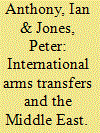

|
|
|
|
|
| Publication |
Abu Dhabi, The Emirates Center for Strategic Studies and Research, 1998.
|
| Description |
39p.
|
| Series |
Emirates Occasional paper;21
|
|
|
|
|
|
|
|
|
|
|
|
Copies: C:1/I:0,R:0,Q:0
Circulation
| Accession# | Call# | Current Location | Status | Policy | Location |
| 040567 | 382.456234/ANT 040567 | Main | On Shelf | General | |
|
|
|
|
| 14 |
ID:
028145
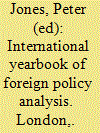

|
|
|
|
|
| Publication |
London,, Croom Helm, 1974.
|
| Description |
v.1(213p.)
|
| Standard Number |
0856640336
|
|
|
|
|
|
|
|
|
|
|
|
Copies: C:1/I:0,R:0,Q:0
Circulation
| Accession# | Call# | Current Location | Status | Policy | Location |
| 015354 | 327.1/JON 015354 | Main | On Shelf | General | |
|
|
|
|
| 15 |
ID:
027138


|
|
|
|
|
| Publication |
London, Croom Helm, 1975.
|
| Description |
v.2(266 p.)
|
| Standard Number |
0856642878
|
|
|
|
|
|
|
|
|
|
|
|
Copies: C:1/I:0,R:0,Q:0
Circulation
| Accession# | Call# | Current Location | Status | Policy | Location |
| 015721 | 327.1/JON2. 015721 | Main | On Shelf | General | |
|
|
|
|
| 16 |
ID:
114433


|
|
|
|
|
| Publication |
2012.
|
| Summary/Abstract |
Could an Iranian regime that had developed a nuclear weapons capacity be "deterred?" What would such deterrence look like? What would both Iran and its foes have to do to promote stability? This article considers these questions, beginning with an exploration of the internal political landscape of Iran and how it influences critical choices made by the regime. Next, the article examines Iran's nuclear program, within the context of domestic decision making as the key driver. Third, the article discusses Iranian culture and negotiating behavior and how these might affect the question of deterrence. Finally, the article asks what it all means for attempts to deter Iran, should it ever become a nuclear weapons-capable state-particularly an undeclared one, which is the most likely outcome.
|
|
|
|
|
|
|
|
|
|
|
|
|
|
|
|
| 17 |
ID:
164370
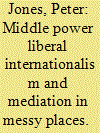

|
|
|
|
|
| Summary/Abstract |
Canada seeks to increase its role in mediation as part of a renewed liberal internationalist foreign policy. This means confronting the question of how to manage the domestic political consequences of engaging as a mediator with those violating cherished international norms, while also upholding the view that they should be punished. Key to all this is the concept of impartiality, particularly as it relates to the objectives of liberal internationalist countries. This paper explores multiple meanings of the term “impartial” as they pertain to mediation, particularly with respect to the question of mediations involving those who have violated international norms. The paper then explores whether increased support for “arms length” mediations, such as Track Two diplomacy, might allow for more involvement in mediation, while avoiding direct involvement in morally fraught situations. The paper concludes that Track Two can be useful in developing a national capacity for international mediation, and that work can also be done to make Track Two—which is currently based largely on Western concepts—more indigenous. However, support for Track Two does not answer the fundamental question of how Canada, as such, can be more active as a mediator if it is not willing to engage with actors who have committed atrocities.
|
|
|
|
|
|
|
|
|
|
|
|
|
|
|
|
| 18 |
ID:
176503


|
|
|
|
|
| Summary/Abstract |
This article unpacks the development of key ideas and debates which surround the ethical issues of Track Two. It defines what is meant by ‘Track Two’ and discusses how ethics might best be applied in practice to these dialogues. The ethical dimensions of four key issues are explored: accountability; the basis on which third parties feel they are entitled to intervene; the problem of dealing with actors who have committed atrocities; and ethical questions surrounding secrecy or confidentiality which is often required. The article suggests several ways forward in terms of creating a mechanism to enable practitioners to assist each other with the challenges they face. The article takes the view that a ‘hard and fast’ set of ethics may not be appropriate for the field, as each intervention is quite different, but rather that a set of ‘reflective questions’ should be developed to help practitioners confront ethical issues.
|
|
|
|
|
|
|
|
|
|
|
|
|
|
|
|
| 19 |
ID:
113112
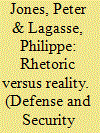

|
|
|
|
|
| Publication |
2012.
|
| Summary/Abstract |
As Canada's military mission in Afghanistan winds down and the country faces several years of fiscal austerity, all of Canada's major political parties are agreed that Canadian defence budgets must stay level or be cut. This comes at a time when the defence department is slated to replace the Canadian Forces' (CF) major equipment fleets. Canada's defence establishment thus faces some critical decisions. One option is to try to maintain its expeditionary capabilities across all three services: army, navy and air force. Absent substantial new infusions of funds, however, this approach is likely to lead to an overall and largely chaotic reduction of capabilities. Another option is to make some difficult choices as to which expeditionary capabilities to maintain as part of a strategic review of Canada's future military needs. Such an option would ensure that Canada has at least some military capacities which can reliably be devoted to the most demanding international operations, while maintaining those capabilities required for domestic duties and North American defence. Pursuing this option would accord with the new North Atlantic Treaty Organization Strategic Concept and the call for "Smart Defense" within the Alliance. This article assesses the arguments for and against the option of specialising Canada's future defence capabilities and explores scenarios as to what a future CF may look like.
|
|
|
|
|
|
|
|
|
|
|
|
|
|
|
|
| 20 |
ID:
087524
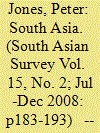

|
|
|
|
|
| Publication |
2009.
|
| Summary/Abstract |
Unlike many other regions of the world that have been experiencing steadily increasing levels of economic and political integration, South Asia remains stubbornly slow in enhancing levels of regional cooperation. This article looks at the issue through the mechanism of the Regional Security Community Theory and asks whether this theory has any relevance for South Asia. It concludes that purist notions of what makes such communities are not likely to be relevant to South Asia for some time. But if one takes a more flexible approach to the theoretical construct, and looks to issues which attend the nascent phase of the development of such communities, one may both discern developments and outline possible strategies that can help to bring about changes in the region's political and strategic reality
|
|
|
|
|
|
|
|
|
|
|
|
|
|
|
|
|
|
|
|
|